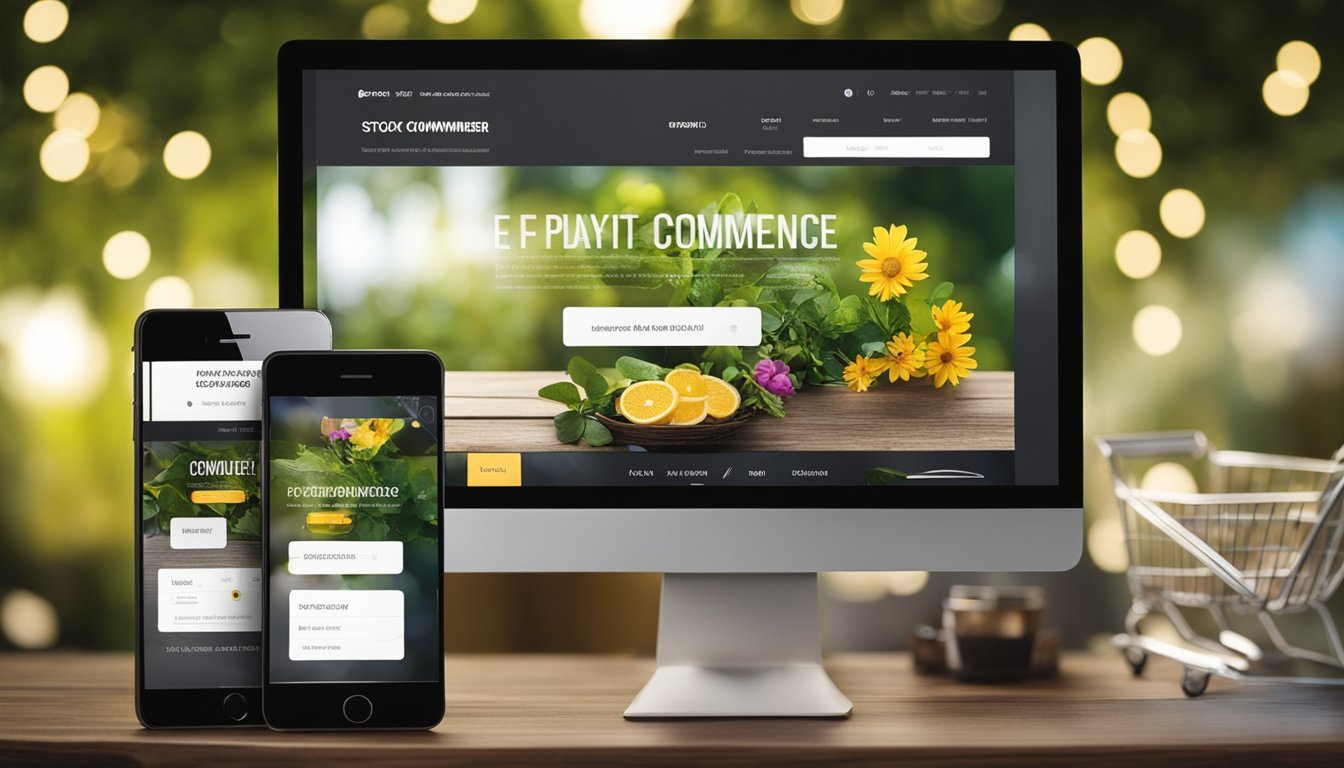Create a Custom ECommerce Platform with Custom Software Development A Comprehensive Guide
Creating a custom e-commerce platform is essential for businesses that want to stand out in the online retail market. A custom platform tailored to meet the specific needs of your business can provide an excellent user experience, increase customer engagement, and boost sales. However, creating a custom e-commerce platform requires expertise in custom software development and an understanding of the e-commerce industry.

Custom software development for e-commerce involves creating a unique platform that caters to the specific needs of your business. This process includes designing and developing custom features, integrating third-party applications, and ensuring seamless functionality. The development process requires a team of experienced software developers, designers, and project managers who can work together to create a platform that meets your business requirements.
Key Takeaways
- Custom e-commerce platforms provide an excellent user experience, increase customer engagement, and boost sales.
- Custom software development for e-commerce involves designing and developing custom features, integrating third-party applications, and ensuring seamless functionality.
- The development process requires a team of experienced software developers, designers, and project managers who can work together to create a platform that meets your business requirements.
Understanding Custom E-Commerce Platform

As an expert in custom e-commerce development, I understand the importance of having a unique and tailored platform for your online store. In today's online retail market, having a generic e-commerce platform may not be enough to stand out from the competition. That's where custom e-commerce development comes in.
Custom e-commerce development involves creating a unique and personalized platform for your e-commerce business. This platform is designed specifically to meet your business needs and goals, and to provide a seamless user experience for your customers.
With custom e-commerce solutions, you have the flexibility to create a platform that is tailored to your business requirements. You can choose the features and functionalities that you need, and integrate them seamlessly into your platform. This allows you to create a unique online store that stands out from the competition.
One of the main benefits of custom e-commerce development is that you have complete control over your platform. You can make changes and updates as needed, without having to rely on a third-party platform. This gives you the flexibility to adapt to changes in the market and to optimize your platform for better performance.
When it comes to custom e-commerce development, there are a variety of e-commerce platforms and software stacks to choose from. Some popular e-commerce platforms in 2023 include Shopify, Magento, WooCommerce, and BigCommerce. Each platform has its own strengths and weaknesses, and the choice will depend on your business needs and goals.
In summary, custom e-commerce development is a great way to create a unique and personalized platform for your online store. With custom e-commerce solutions, you have the flexibility to create a platform that meets your business needs and goals, and to provide a seamless user experience for your customers.
Process of Custom Software Development for E-Commerce

As an experienced software developer, I understand the importance of following a well-defined process for custom software development. When it comes to creating a custom e-commerce platform, this process becomes even more critical. Here is an overview of the process I follow for custom software development for e-commerce.
Planning and Analysis
The first step in the process is to thoroughly analyze the requirements of the e-commerce platform. This includes understanding the business goals, target audience, and the features and functionalities required for the platform. Once the requirements are analyzed, I create a detailed project plan that outlines the development process, timelines, and milestones.
Design and Customization
The next step is to design the e-commerce platform and customize it to meet the specific needs of the business. This includes creating wireframes, designing the user interface, and customizing the platform's features and functionalities. During this phase, I work closely with the client to ensure that the design and customization meet their expectations.
Development and Custom Coding
Once the design and customization are complete, the development phase begins. This involves writing custom code to develop the e-commerce platform. I use the latest technologies and programming languages to ensure that the platform is scalable, secure, and user-friendly. Throughout the development phase, I conduct regular testing to ensure that the platform is functioning as expected.
Integration and Testing
Once the development phase is complete, the platform is integrated with third-party tools and services. This includes payment gateways, shipping providers, and inventory management systems. After integration, I conduct rigorous testing to ensure that the platform is working seamlessly with all integrated services.
Launch and Post-Launch Support
After testing is complete, the e-commerce platform is ready to launch. I work closely with the client to plan a smooth launch and provide post-launch support to ensure that the platform is functioning optimally. This includes monitoring the platform's performance, fixing any issues that arise, and providing ongoing maintenance and support.
In conclusion, the process of custom software development for e-commerce involves careful planning, design, development, integration, and testing. By following a well-defined process, I can ensure that the e-commerce platform is customized to meet the specific needs of the business and is optimized for performance, security, and user experience.
Key Features and Integration of a Custom E-Commerce Platform

As a software developer, I know that creating a custom e-commerce platform involves a lot of planning and execution. When developing a custom e-commerce platform, there are several key features and integrations that need to be considered.
Firstly, inventory management is an essential feature of any e-commerce platform. It is crucial to have a system in place that tracks inventory levels and notifies customers when products are out of stock. This ensures that customers are not disappointed when they try to purchase a product that is no longer available.
Shipping is another important aspect of e-commerce. A custom e-commerce platform should have a shipping module that allows customers to choose their preferred shipping method, track their orders, and receive notifications when their order is shipped.
The theme and shopping experience are also critical components of an e-commerce platform. A custom e-commerce platform should provide a seamless and user-friendly shopping experience for customers. The platform should be visually appealing, easy to navigate, and provide customers with all the information they need to make informed purchasing decisions.
When it comes to e-commerce platforms, WooCommerce and Magento are two of the most popular options. A custom e-commerce platform should integrate with these platforms to provide customers with a wide range of features and functionalities.
User experience is also a crucial aspect of e-commerce. A custom e-commerce platform should be designed with the user in mind, providing a personalized experience that meets their needs and preferences.
Features such as tracking and ERP integration are also essential for a custom e-commerce platform. These features allow businesses to track their orders, manage their inventory, and streamline their operations.
Payment gateway integration is another critical feature of an e-commerce platform. A custom e-commerce platform should integrate with popular payment gateways, such as PayPal and Stripe, to provide customers with a seamless checkout experience.
Navigation and CMS are also important considerations for a custom e-commerce platform. The platform should be easy to navigate, with a clear and concise menu structure. A content management system should also be in place to allow businesses to manage their content and product listings easily.
Mobile apps, web hosting, SSL certificates, checkout experience, communication, inventory management, chatbots, order tracking, payment integrations, and return policies are other important features and integrations that should be considered when developing a custom e-commerce platform.
In conclusion, developing a custom e-commerce platform requires careful planning and execution. By considering the key features and integrations outlined above, businesses can create a platform that meets their unique needs and provides customers with a seamless shopping experience.
Challenges and Solutions in Custom E-Commerce Development

Creating a custom e-commerce platform can be a complex process, and developers often encounter various challenges along the way. In this section, I will discuss some of the most common challenges and provide solutions to overcome them.
Support
One of the biggest challenges in custom e-commerce development is providing adequate support to customers. It is crucial to have a support system in place that can quickly respond to customer inquiries and resolve any issues they may have. Providing multiple channels for customers to reach out, such as email, phone, and live chat, can also improve customer satisfaction.
Security
Security is another critical aspect of custom e-commerce development. It is essential to ensure that the platform is secure enough to protect customer data and transactions. Implementing SSL certificates and two-factor authentication can help improve security.
Costs
Custom e-commerce development can be expensive, and it is essential to have a clear understanding of the costs involved. It is crucial to set a realistic development budget and consider all the expenses, including hosting, domain name, development, and maintenance costs.
Scalability
Scalability is another challenge that custom e-commerce platforms face. It is crucial to ensure that the platform can handle an increase in traffic and transactions without any performance issues. Using cloud hosting services and optimizing the platform's code can help improve scalability.
Off-the-Shelf Solutions
Off-the-shelf solutions like Shopify, WordPress, and Squarespace can be a tempting option for e-commerce development. However, they may not always fit the business's specific needs and requirements. Custom e-commerce development services can help create a platform that is tailored to the business's unique needs and goals.
Optimization
Optimizing the platform for search engines and user experience is crucial for the success of the e-commerce platform. Using a website builder like Wix or outsourcing to an e-commerce developer can help optimize the platform's UX/UI and SEO.
Payment Methods
Offering multiple payment methods like Stripe and PayPal can improve customer satisfaction and increase sales. It is crucial to ensure that the payment methods are secure and comply with tax and accounting regulations.
Shipping
Shipping software integration is essential for e-commerce platforms. Integrating with shipping carriers like Amazon and implementing a CRM system can help automate and streamline the shipping process.
Pandemic
The COVID-19 pandemic has significantly impacted the e-commerce industry. It is crucial to adapt to the new normal and implement measures like contactless delivery and social media marketing to increase sales and customer engagement.
In conclusion, custom e-commerce development can be challenging, but with the right solutions and strategies, businesses can create a successful and profitable platform that meets their unique needs and goals.
Frequently Asked Questions

What are the benefits of creating a custom e-commerce platform with custom software development?
A custom e-commerce platform developed with custom software development offers various benefits, such as flexibility, scalability, and security. With a custom platform, businesses can tailor their online store to meet their unique needs and requirements. This means that the platform will be able to handle the business's current and future needs, as it can be easily scaled up or down as needed. Additionally, custom e-commerce platforms are more secure than off-the-shelf solutions, as they are built with security in mind from the ground up.
How can custom e-commerce development improve my business?
Custom e-commerce development can improve your business by providing a unique online store that is tailored to your specific needs. This means that you can offer a better user experience to your customers, which can lead to increased sales and customer loyalty. Additionally, a custom e-commerce platform can be integrated with other business systems, such as inventory management and CRM, to provide a seamless experience for both customers and employees.
What are the key features to consider when building a custom e-commerce platform?
When building a custom e-commerce platform, there are several key features to consider. These include a user-friendly interface, secure payment processing, inventory management, product catalog, search functionality, and customer management. Additionally, the platform should be scalable, mobile-friendly, and optimized for search engines.
How can I find the right eCommerce website developers for my project?
To find the right eCommerce website developers for your project, you should consider their experience, expertise, and portfolio. Look for developers who have experience building custom e-commerce platforms and who have a deep understanding of the technologies involved. Additionally, check their portfolio to see if they have worked on similar projects in the past.
What are some successful examples of custom eCommerce solutions?
Some successful examples of custom eCommerce solutions include Amazon, Etsy, and Shopify. These platforms have been tailored to meet the unique needs of their businesses and have helped them to become leaders in their respective industries.
What factors should I consider when choosing a customizable eCommerce platform?
When choosing a customizable eCommerce platform, you should consider factors such as ease of use, scalability, security, support, and integrations. Additionally, consider the platform's pricing structure and whether it offers the features and functionality that your business needs.

We are committed to delivering a new level of automation that will help organizations save time, money, and staffing resources.
 WRITE FOR US!
WRITE FOR US!
